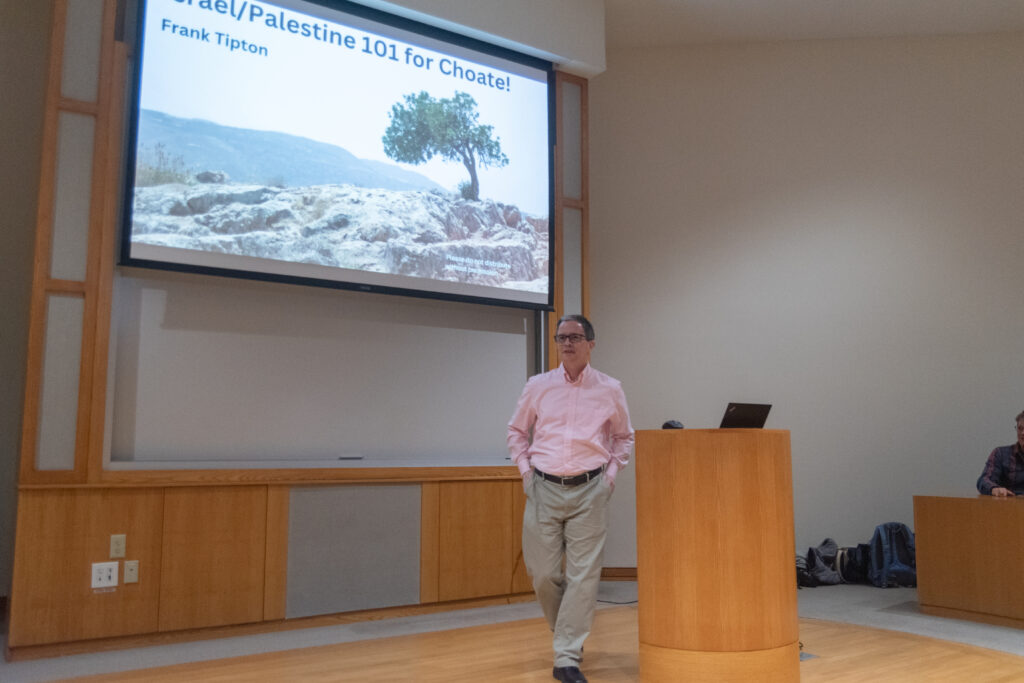
Mr. Frank Tipton presents on the historical context of the Israel and Palestine conflict.
By Nilan Kathir ’25
On January 25, Mr. Frank Tipton, a teacher at the Dana Hall School and an expert on education related to Southwest Asia and North Africa, provided informational programming for students on the history of the Israel-Palestine conflict.
Prior to his talk in Getz Auditorium, Mr. Tipton met with members of the Choate Hillel cabinet and core members of the Middle Eastern and North African (MENA) Club to prepare for the program and frame his remarks.
To start off, Mr. Tipton clarified that the program’s point of focus was not on the current conflict, but rather the historical context of Israel and Palestine and the lived experiences of both countries’ citizens.
He broke up the presentation into four sections: “the formative years,” “the surprise,” “the peace so close,” and “the hardening.” In between these sections, attendees had the chance to ask questions about the talk and the conflict.
One of Mr. Tipton’s goals was to foster empathetic and sensitive conversations through his talk. “Silence is not productive,” he explained. He noted how indifference can be one of the most dangerous qualities for people living in times of crisis to possess. “Indifference is, in my view, the absence of compassion and the pain that people feel for not having their story heard,” he said.
Mr. Tipton also emphasized the need for support, alongside further education, on this topic: “People directly connected to this conflict need visibility and compassion.” He continued, saying, “This involves denouncing hate and recognizing that any form of antisemitism, anti-Arab racism, and anti-Muslim bigotry is virulent.”
Blake Steremberg ’26, Hillel cabinet member and program attendee, agreed. “It is beneficial to provide an environment that students can feel free from discrimination and feel best supported,” he said.
To ensure he navigated the nuances of the topic with impartiality, Mr. Tipton disclosed his background as an educator in the North African and Southwest Asian regions at the beginning of his presentation and shared the history and demographics of both Israeli and Palestinian groups.
“I think the speaker did a good job of laying out the basic history of the concept, which allowed people to share their interpretations of what happened since everyone there [at the presentation] had the same groundwork to go off of,” Judah Brecher ’25, another student present at the program, said.
At the end of his talk, Mr. Tipton directed students to reliable resources for further research and shared notable examples of humanitarian work in the region. One such example was Friends of Roots, an organization founded by both Palestinians and Israelis aimed towards “[making] changes to end [their] conflict,” as stated on their website.
Reflecting on the event, Brecher said, “I think there was a lot of conversation immediately after the speech … the presentation gave people the chance to talk about the conflict in a historical context.”
Arabic teacher and MENA faculty adviser Mr. Yassine Benzinane hoped that through Mr. Tipton’s presentation, “students will become motivated to pursue independent research about the region, to appreciate that every presentation comes from a certain lens, and to also learn about the history through other perspectives.”
Mr. Tipton himself hopes that his audience will “have a humanitarian sense of the people involved in the conflict, some sensibility, and also competence to learn more and support the peoples of the region.”
“It’s a complex situation, and we need to put the people who are impacted by it first over anything else,” attendeee Andy Stahlman ’26 shared.




